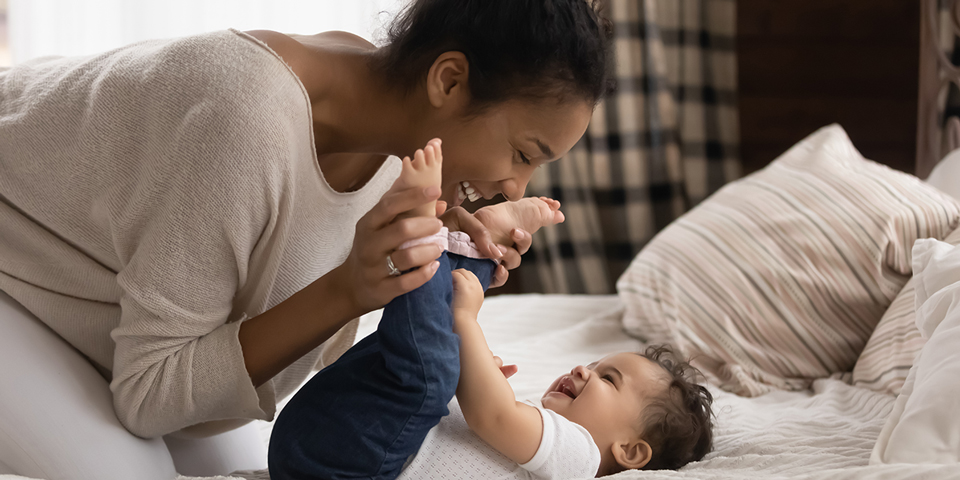How soon after giving birth can I safely get pregnant again?

If you’ve just had a baby, it probably seems counterintuitive to wonder when it’s safe to get pregnant again. After all, you’re down in the trenches of caring for a newborn: running on next to no sleep, changing at least eight diapers a day and feeding your baby ... all the time.
But we can’t plan for everything in life, and your personal circumstances may lead you to wonder when it’s safe to get pregnant again after giving birth. Maybe the thought of getting pregnant right now (or ever again!) exhausts you — so how can you ensure you don’t? Maybe you want to have many babies and can’t wait to start trying to conceive (TTC) again — when is it safe to do so? Maybe it’s only been a few months (or weeks!) and you just found out you’re pregnant again — now what?
Here we discuss the many considerations of having (or avoiding) back-to-back pregnancies.
In this article
- How soon can you get pregnant after giving birth?
- How do I avoid getting pregnant soon after giving birth?
- How long should you wait after giving birth before getting pregnant again?
- Can you get pregnant while breastfeeding?
- Are you more fertile in the first year after giving birth? And is it possible to be less fertile after giving birth?
- What is the average time it takes to get pregnant with a second child?
- What are the risks of getting pregnant soon after giving birth?
- I’ve recently given birth and just found out I’m pregnant again. What do I do?
How soon can you get pregnant after giving birth?
It depends. According to the American College of Obstetricians and Gynecologists (ACOG), “if you’re breastfeeding, ovulation may be delayed, but it usually returns by about six months.”1 Additionally, per a 2011 systematic review, “most nonlactating women will not ovulate until six weeks postpartum.”2
However, it is possible to get pregnant within a few weeks of childbirth.1 Although uncommon, if you’re not breastfeeding, ovulation can occur within a few weeks of childbirth, before you start having your period again.1,2
How do I avoid getting pregnant soon after giving birth?
It’s a good idea to talk to your healthcare provider about the birth control method you plan to use after pregnancy; ideally, you should discuss this before your delivery date.1 According to the ACOG, the birth control you choose postpartum will be affected by several factors, including timing.1 You can start some birth control methods immediately after birth, whereas you may have to wait a little while to start others.1 You should also consider effectiveness — for example, the ACOG notes that “the sponge and cervical cap are much less effective after you give birth.”1
Finally, think about whether or not you’ll be breastfeeding.1 While the ACOG states that “all methods [of birth control] are safe to use while breastfeeding,” they follow up by saying that some methods “are not recommended during the first few weeks of breastfeeding because there is a very small risk that they can affect your milk supply.”1 Your healthcare provider can help you choose the best birth control method for you.
How long should you wait after giving birth before getting pregnant again?
Most experts recommend waiting at least 18 months after giving birth before getting pregnant again.3,4 Additionally, the ACOG says you should avoid getting pregnant sooner than six months after giving birth.3 There are a few exceptions: the March of Dimes states, “If you’re older than 35 or have had a miscarriage ... talk to your provider about how long to wait between pregnancies.”4 The 18-month spacing may not be necessary or recommended in these situations.4
Can you get pregnant while breastfeeding?
Yes. If you aren’t exclusively and frequently breastfeeding, it’s possible to get pregnant while breastfeeding.5 Some people use breastfeeding as a form of birth control. This is called the lactational amenorrhea method (LAM). According to Harvard Health Publishing, studies show that LAM can be 98% effective if all three of the following guidelines are followed precisely:
- The “baby is younger than 6 months old and is only breastfeeding” (no formula, no solid food);
- You are strictly breastfeeding “at least every four hours during the day and every six hours overnight”; and,
- You have not had any periods since giving birth.5
If any of these statements is no longer true, pregnancy while breastfeeding is possible.5
Are you more fertile in the first year after giving birth? And is it possible to be less fertile after giving birth?
You may have heard that people are “super fertile” after giving birth, but there’s no scientific evidence indicating that fertility increases post childbirth. Secondary infertility, which means you’re unable to get pregnant after successfully giving birth before, is just as common as primary infertility, affecting about 11% of couples in the U.S.6
You may have also heard that pregnancy can ease the symptoms of endometriosis, making getting pregnant in the future easier, which is perhaps why some people believe you can be more fertile after giving birth. But a 2018 study in Human Reproduction Update shows that pregnancy has fewer beneficial effects on endometriosis than previously reported.7
What is the average time it takes to get pregnant with a second child?
The time it takes to get pregnant with a second child is based on many factors, all tied to fertility. Both the ACOG and the March of Dimes recommend you wait 18 months before getting pregnant after giving birth.3,4 It’s also important to know that once you start TTC, it can happen right away or it can take up to a year or longer. Learn more about how long it can take to get pregnant.
What are the risks of getting pregnant soon after giving birth?
According to the March of Dimes, too little time between pregnancies increases the chance of a premature birth, and the shorter the amount of time between birth and pregnancy, the higher the risk.4 Premature babies are more likely to have varying health problems.4 According to the ACOG, a pregnancy that occurs less than 18 months after a C-section comes with an increased risk of uterine rupture during labor.3 Being able to let your body fully heal and recover during the 18-month period may help reduce some of these risks. The March of Dimes believes this recovery period gives your body time to: 1) return its supply of nutrients to a healthy level, 2) recover from any infections and inflammation that may have occurred during the pregnancy and 3) allow the microbiome within the birth canal to replenish.4
I’ve recently given birth and just found out I’m pregnant again. What do I do?
Once you know you’re pregnant, call your healthcare provider — early prenatal care is important regardless of how recently you gave birth. Of note: Some people get pregnant before their first period returns after childbirth and may not realize it.1 Knowing the signs of early pregnancy can help.
If you’re still taking your prenatal vitamin, or if you’re currently breastfeeding, the ACOG and Cleveland Clinic recommend that you continue taking one.8,9 Speaking of breastfeeding, talk to your healthcare provider about whether to continue breastfeeding if you are currently pregnant. Usually it’s OK to continue, but due to possible side effects, including physical discomfort, uterine contractions, changes in your breast milk and possible health risks to the fetus, your healthcare provider can help you determine if continuing to breastfeed while pregnant is the best option for everyone involved.10
Otherwise, the same self-care tips for your previous pregnancy apply to this pregnancy as well. Importantly, give yourself some grace. You’re likely to be extra tired this time around. On top of the fatigue that’s common in the first trimester,11 you’re likely to be sleep-deprived while caring for a newborn.
No matter your situation, if you have any questions about pregnancy after childbirth, talk to your healthcare provider. Their intimate understanding of your situation will help them guide you through the next steps.
Related Articles
- The American College of Obstetricians and Gynecologists. Postpartum birth control. Updated April 2023. Accessed May 17, 2023. https://www.acog.org/womens-health/faqs/postpartum- birth-control
- Jackson E, Glasier A. Return of ovulation and menses in postpartum nonlactating women: a systematic review. Obstet. Gynecol. 2011;117(3):657-662. doi: 10.1097/AOG.0b013e31820ce18c. Accessed May 17, 2023. https://journals.lww.com/greenjournal/Abstract/2011/03000/Return_of_Ovulation_and_Mens es_in_Postpartum.20.aspx
- The American College of Obstetricians and Gynecologists. Interpregnancy care. Updated January 2019. Accessed May 17, 2023. https://www.acog.org/clinical/clinical-guidance/obstetric-care- consensus/articles/2019/01/interpregnancy-care
- March of Dimes. How long should you wait before getting pregnant again? Updated July 2017. Accessed May 17, 2023. https://www.marchofdimes.org/find-support/topics/planning- baby/how-long-should-you-wait-getting-pregnant-again
- Blake RA. Harvard Health Publishing. Can breastfeeding really prevent pregnancy? Updated March 2, 2022. Accessed May 17, 2023. https://www.health.harvard.edu/blog/can- breastfeeding-really-prevent-pregnancy-202203022697
- Cleveland Clinic. Secondary infertility. Updated March 7, 2023. Accessed May 17, 2023. https://my.clevelandclinic.org/health/diseases/21139-secondary-infertility
- Leeners B, Damaso F, Oshsenbein-Kölble N, Farquhar C. The effect of pregnancy on endometriosis — facts or fiction?. Hum. Reprod. Update. 2018;24(3):290-299. doi: 10.1093/humupd/dmy004. Accessed May 17, 2023. https://academic.oup.com/humupd/article/24/3/290/4859612
- The American College of Obstetricians and Gynecologists. Nutrition during pregnancy. Updated June 2023. Accessed July 28, 2023. https://www.acog.org/womens-health/faqs/nutrition- during-pregnancy
- Cleveland Clinic. When should you start taking prenatal vitamins? Updated January 6, 2022. Accessed May 17, 2023. https://health.clevelandclinic.org/when-to-start-taking-prenatal- vitamins/
- Kunde R. WebMD. What to know about breastfeeding while pregnant. Updated April 11, 2022. Accessed May 17, 2023. https://www.webmd.com/baby/what-to-know-breastfeeding-while- pregnant
- Cleveland Clinic. First trimester. Updated August 22, 2022. Accessed May 17, 2023. https://my.clevelandclinic.org/health/articles/9699-first-trimester




